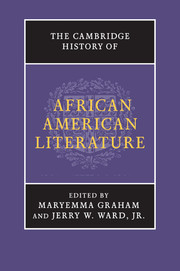Book contents
- Frontmatter
- Introduction
- PART I AFRICAN AMERICAN LITERATURE FROM ITS ORIGINS TO THE TWENTIETH CENTURY
- PART II AFRICAN AMERICAN LITERATURE IN THE TWENTIETH CENTURY
- PART III AFRICAN AMERICAN LITERATURE AS ACADEMIC AND CULTURAL CAPITAL
- 24 Children's and young adult literatures
- 25 From writer to reader: black popular fiction
- 26 Cultural capital and the presence of Africa: Lorraine Hansberry, August Wilson, and the power of black theater
- 27 African American literature: foundational scholarship, criticism, and theory
- 28 African American literatures and New World cultures
- Bibliography
- Index
- References
26 - Cultural capital and the presence of Africa: Lorraine Hansberry, August Wilson, and the power of black theater
from PART III - AFRICAN AMERICAN LITERATURE AS ACADEMIC AND CULTURAL CAPITAL
Published online by Cambridge University Press: 28 May 2011
- Frontmatter
- Introduction
- PART I AFRICAN AMERICAN LITERATURE FROM ITS ORIGINS TO THE TWENTIETH CENTURY
- PART II AFRICAN AMERICAN LITERATURE IN THE TWENTIETH CENTURY
- PART III AFRICAN AMERICAN LITERATURE AS ACADEMIC AND CULTURAL CAPITAL
- 24 Children's and young adult literatures
- 25 From writer to reader: black popular fiction
- 26 Cultural capital and the presence of Africa: Lorraine Hansberry, August Wilson, and the power of black theater
- 27 African American literature: foundational scholarship, criticism, and theory
- 28 African American literatures and New World cultures
- Bibliography
- Index
- References
Summary
Invariably, through time, black theater practitioners and critics have viewed the theater as a critical venue for affecting and effecting black cultural politics. W. E. B. Du Bois and Alain Locke each proclaimed the need for a black-controlled theater to articulate a distinct black identity. Predating the ideological outlines of the 1960s “Black Aesthetic,” Locke recognized the African presence in African American life and argued for a Negro art that pushed beyond established dramatic conventions. In his well-known manifesto for a Negro theater, Du Bois states that “a real Negro theatre” must be “About us, By us, For us, and Near us.” For Du Bois, theatrical representation is critical to the achievement of African American transformation and emancipation. Notably, Du Bois's call for a segregated black theater resonates in Amiri Baraka's 1965 radical proclamation “The Revolutionary Theatre” and August Wilson's speech to the 1996 Theatre Communications Group National Convention, “The Ground on Which I Stand.” Baraka proclaims that the Revolutionary Theatre is “a political theatre, a weapon to help the slaughter of these dimwitted fatbellied white guys who somehow believe that the rest of the world is here for them to slobber on.” Aligning himself with the African American history of struggle and survival as well as the black tradition of a functional art of protest, Wilson states: “I stand myself and my art squarely on the self-defining ground of the slave quarters, and find the ground to be hallowed and made fertile by the blood and bones of the men and women who can be described as warriors on the cultural battlefield that affirmed their self-worth.”
- Type
- Chapter
- Information
- The Cambridge History of African American Literature , pp. 680 - 702Publisher: Cambridge University PressPrint publication year: 2011
References
- 1
- Cited by



